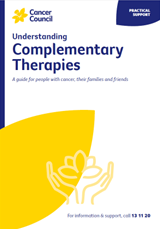What is it?
Yoga involves holding postures (asanas) with the body, being aware of breathing, and focusing the mind. Yoga originated in India and is now popular around the world. There are many styles of yoga with varying intensity – from gentle to more vigorous.
Why use it
To increase physical activity and improve emotional health.
What to expect
Wear comfortable clothes. You may be asked to remove your shoes before entering the yoga room. You usually use a yoga mat – this may be provided or you may need to bring your own. Most classes last for around one hour. A typical routine involves focusing on quietening the mind and working with the breath. A session usually begins with warm-up stretches followed by a series of yoga postures, and ends with relaxation. Some cancer centres offer yoga classes that are designed for people during cancer treatment or recovery.
Some styles of yoga may not be suitable during some stages of cancer or depending on your abilities. Talk to the yoga instructor about any precautions you should take and whether they can offer any modifications or support.
What is the evidence?
Clinical practice guidelines on cancer pain include offering yoga to people experiencing pain related to taking aromatase inhibitors, as well as pain after treatment for some cancers. Clinical practice guidelines also suggest yoga as a way to manage cancer-related fatigue.
There is evidence that yoga has positive effects on decreasing stress and anxiety, reducing sleep disturbances, improving muscle strength and enhancing quality of life. The focus on breathing may also help reduce pain.
→ READ MORE: Caring for someone with cancer
Podcast: Coping with a Cancer Diagnosis
Listen to more of our podcast for people affected by cancer
More resources
Dr David Joske, Clinical Haematologist, Sir Charles Gairdner Hospital and PathWest, Chairman and Founder Solaris Cancer Care Foundation, Clinical Professor of Medicine, The University of Western Australia, WA; Australasian Integrative Medicine Association (AIMA); Dr Robert Blum, Clinical Director, Cancer Services, Bendigo Health, NSW; Sally Brooks, Senior Pharmacist, Medicines Information, Peter MacCallum Cancer Centre, VIC; Dr Suzanne Grant, Senior Research Fellow, NICM Health Research Institute, Western Sydney University, and Chris O’Brien Lifehouse, NSW; Prof Danforn Lim, Adjunct Professor and Advisory Board Member, NICM Health Research Institute, Western Sydney University, and Adjunct Professor, UTS, NSW; Christina Line, Statewide Services Senior Coordinator, Cancer Council WA; Jen McKenzie, Physiotherapist (Lymphoedema) and ESSA Accredited Exercise Physiologist, The McKenzie Clinic, QLD; Simone Noelker, Wellness Centre and Pastoral Care Manager, Ballarat Regional Integrated Cancer Centre, VIC; Dr Nirzari Pandit, General Practitioner, RACGP Specific Interests Integrative Medicine Group, NSW; Georgie Pearson, Consumer; Cris Pirone, Counsellor, Cancer Council SA; Dr Elysia Thornton-Benko, Specialist General Practitioner, and UNSW Research Fellow, NSW; Kirsty Trebilcock, 13 11 20 Consultant, Cancer Council SA.
View the Cancer Council NSW editorial policy.
View all publications or call 13 11 20 for free printed copies.
Need to talk?
Support services
Coping with cancer?
Speak to a health professional or to someone who has been there, or find a support group or forum
Looking for transport, accommodation or home help?
Practical advice and support during and after treatment
Cancer information
Dealing with the diagnosis
Common reactions to a cancer diagnosis and how to find hope
Explore our resource hub
Explore and download our booklets, fact sheets, podcasts, webinars and videos for people affected by cancer

